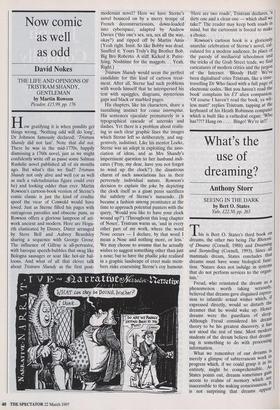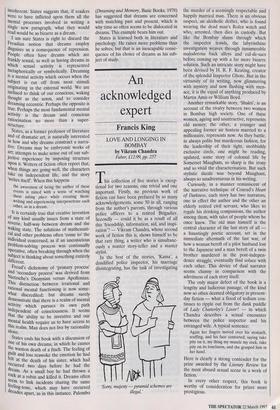What's the use of dreaming?
Anthony Storr
SEEING IN THE DARK by Bert O. States Yale, £22.50, pp. 265 This is Bert 0. States's third book 00 dreams, the other two being The Rhetoric of Dreams (Cornell, 1988) and Dreaming and Storytelling (Cornell, 1993). Since all mammals dream, States concludes that dreams must have some biological flow' tion. 'Nature does not indulge in systems that do not perform services to the organ- ism.'
Freud, who reinstated the dream as a phenomenon worth taking seriously, believed that dreams gave disguised expres.- sion to infantile sexual wishes which, 11 expressed directly, would so disturb the dreamer that he would wake up. Hence dreams were the guardians of sleep. Although Freud considered his dream theory to be his greatest discovery, it has not stood the test of time. Most modern students of the dream believe that dream- ing is something to do with processa information. What we remember of our dreams is merely a glimpse of subterranean work 111 its entirety, which, if we could grasp it in entirety, might be comprehensible. .+6's States points out, dreams sometimes gam access to realms of memory which are inaccessible to the waking consciousness. 11 is not surprising that dreams appear incoherent. States suggests that, if readers were to have inflicted upon them all the mental processes involved in writing a single new paragraph, what they would read would be as bizarre as a dream.
I am sure States is right to discard the Freudian notion that dreams employ disguises as a consequence of repression. People often have dreams which are frankly sexual, as well as having dreams in which sexual activity is represented Metaphorically or symbolically. Dreaming is a mental activity which occurs when the subject is cut off from most stimuli originating in the external world. We are inclined to think of our conscious, waking thought as the norm, and to consider dreaming eccentric. Perhaps the opposite is true. Perhaps the most fundamental mental activity is the dream and conscious ratiocination no more than a super- structure.
States, as a former professor of literature and of dramatic art, is naturally interested in how and why dreams construct a narra- tive. Dreams may be embryonic works of art; attempts to make sense out of our sub- jective experience by imposing structure upon it. Writers of fiction often report that, when things are going well, the characters take on independent life, and the story writes itself. When this happens
the awareness of being the author of these events is mixed with a sense of watching them taking place while creating them: writing and experiencing interpenetrate each other, as in a dream.
It is certainly true that creative invention of any kind usually issues from a state of reverie, half-way between dream and the Waking state. The solutions of mathemati- cal and other problems often 'come to' the individual concerned, as if an unconscious problem-solving process was continually Operative, often breaking through when the subject is thinking about something entirely different.
Freud's dichotomy of 'primary process' and 'secondary process' was derived from Nietzsche's Dionysian versus Apollonian. This distinction between irrational and rational mental functioning is now some- what discredited; but dreams surely demonstrate that there is a realm of mental activity which pursues its own path independent of consciousness. It seems that the ability to be inventive and our mental health require us to have access to this realm. Man does not live by rationality alone.
States ends his book with a discussion of one of his own dreams, in which he causes the wanton death of a finch. The feeling of guilt and loss reawoke the emotion he had felt at the death of his sister, which had uccurred two days before he had the dream. As a small boy he had thrown a rock at a robin and killed it. Dreams often seemto link incidents sharing the same feeling-tone, which may have occurred decades apart, as in this instance. Palombo (Dreaming and Memory, Basic Books, 1978) has suggested that dreams are concerned with matching past and present, which is why time so often seems to be dislocated in dreams. This example bears him out.
States is learned both in literature and psychology. He raises more problems than he solves; but that is an inescapable conse- quence of his choice of dreams as his sub- ject of study.



































































 Previous page
Previous page